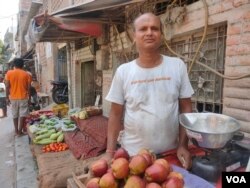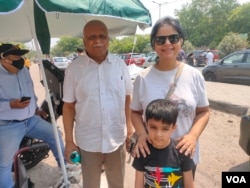Millions of Indians lined up Saturday at polling booths to cast their votes in the penultimate phase of the country’s multistage election in which Prime Minister Narendra Modi is seeking a third term in office.
The polling was held in 58 constituencies across eight states and federal territories amid a scorching heat wave that has seen temperatures in parts of north India soar to 45 degrees Celsius (113 Fahrenheit) in the past week.
Modi’s Bharatiya Janata Party, or BJP, which is pitted against an opposition alliance of the Congress Party and regional parties, is widely expected to win the elections.
Among the most closely watched contests are seven parliamentary seats in the capital, Delhi, where the BJP faces a joint fight mounted by the Aam Aadmi Party headed by Delhi Chief Minister Arvind Kejriwal and the Congress Party.
Kejriwal, who was arrested in March in connection with corruption allegations, was released on bail by the Supreme Court earlier this month to allow him to campaign.
In fiery speeches, Kejriwal has accused Modi of sending opposition leaders to jail to cripple his political rivals.
“People are voting in large numbers against dictatorship, inflation and unemployment,” he said after casting his vote.
Political analyst Nilanjan Mukhopadhyay said, “I think Kejriwal’s release and his campaign [have] given a huge momentum to the opposition. Many people do see the allegations against him as politically motivated and believe he was arrested to prevent him from campaigning.”
The BJP’s optimism about returning to power relies largely on Modi’s popularity, especially in populous northern states. The party had won 45 of the 58 seats where polling was conducted on Saturday.
In a message on social media platform X, Modi called on people, especially women and youth, to vote in large numbers. “Democracy thrives when its people are engaged and active in the electoral process.”
Among those who cast their vote early was Sanjay Jha, a fruit seller in New Delhi. “Modi is a very good leader for the country. There is nobody like him,” said Jha, folding his hands as a mark of respect for the Indian leader.
Jha cites Modi’s inauguration of a grand Hindu temple earlier this year on the site of a mosque destroyed three decades ago among the reasons for his support.
In the Hindu majority country, the BJP’s Hindu nationalist policies have won Modi wide support, but critics call him a polarizing leader. During the campaign, he has been accused of using divisive rhetoric — at rallies he and other top leaders of the BJP have said the Congress Party plans to favor Muslims at the expense of Hindus if voted to power.
Modi has said he is not against Islam or Muslims.
In a country where the opposition has been weakened over the last decade by the rise of the BJP, lawyer Vartika Sharma, a New Delhi resident, said she wants to see both a strong government and a strong opposition.
“I am happy that the BJP government took some strong decisions that were good for the country, but somewhere the radicalization that is happening, I am not able to agree to it,” said Sharma after casting her vote. “Whichever government comes should uphold the constitution principles and weed out corruption.”
Before elections began, Modi had set a goal of attaining a supermajority by winning, along with his party’s allies, 400 of the 543 elected seats in the lower house of parliament.
While the BJP is expected to emerge ahead of other parties, the opposition is hoping to make gains amid disaffection on the ground over joblessness and rising prices.
The Congress party has flagged the need to address rising unemployment and alleviate rural distress and has focused its campaign on the need for social justice.
“The BJP appeared to be supremely confident when the election got underway. But Modi has failed to construct an overarching national narrative, as a result of which the election is now focused on local constituency level issues. There is no one single issue binding the campaign,” according to analyst Mukhopadhyay.
As the heat wave raised fears for voters who often have to wait in long lines at polling stations, the Election Commission put up tents and mist fans and deployed paramedics at polling stations in Delhi.
The blistering weather did not deter 90-year-old K.C. Gupta in New Delhi from casting his vote. “I think something must be done to improve the lives of people in this country, especially the lower strata. They should be helped as much as possible,” he said.
The final round of voting will be held on June 1, and votes will be counted on June 4. The results are expected the same day.




